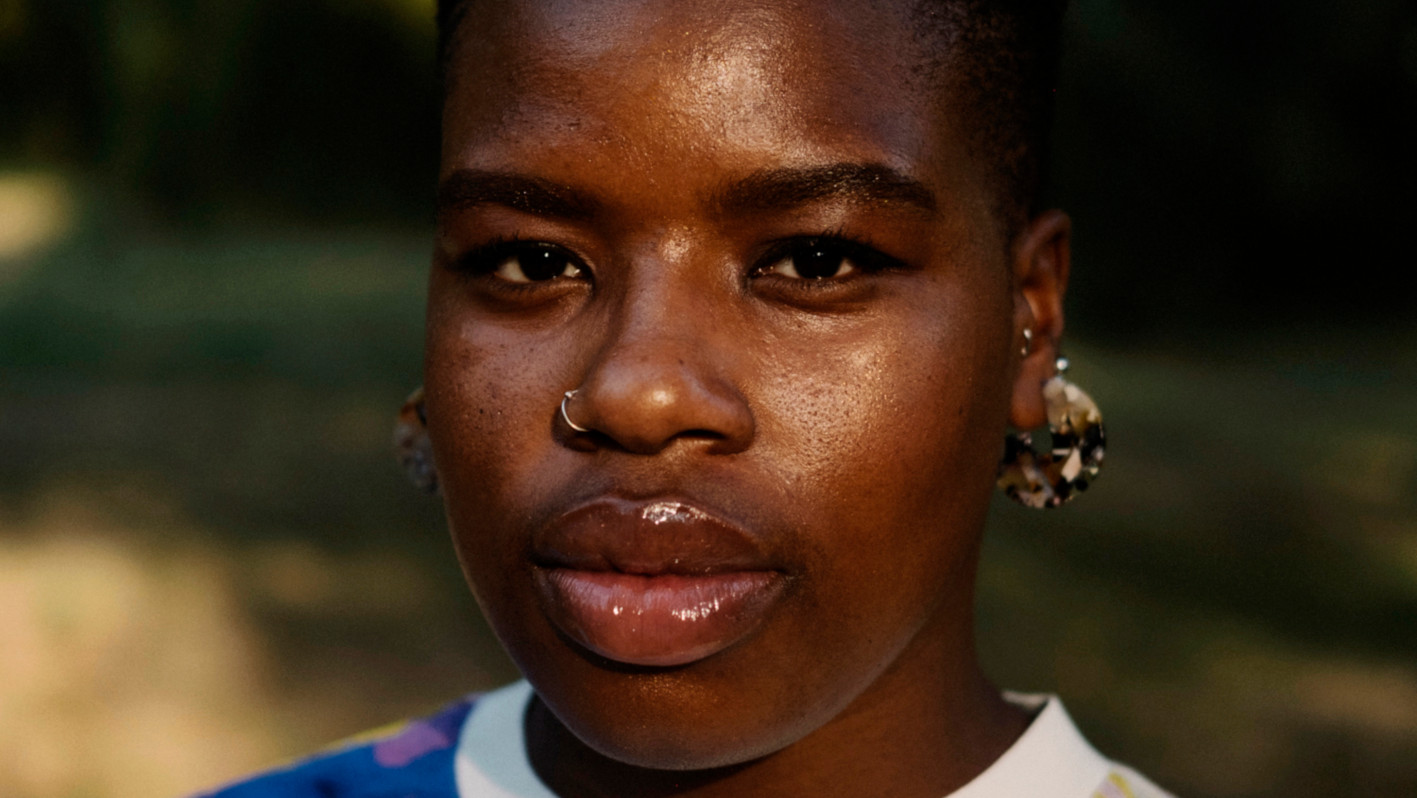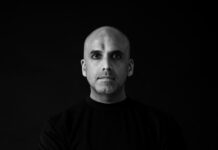Photo: Press (Juba)
It does not happen opften, but sometimes, a DJ will be asked to record a mix for our Groove podcast directly after playing, but that is what happend to Juba. The Boko! Boko! member was playing a warm-up set at Panorama Bar during a CTM Festival night that brought the place to boil in only two hours thanks to a vivid mix of gqom and kuduro beats with a captivating Destiny’s Child remix thrown in for good measure. Fast forward half a year later and Juba’s mix for Groove is equally adventurous, although heavier and darker than her usual mixes, as the DJ herself points out. Listen to it below our interview.
You haven’t been DJing for long, at least not under the name of Juba. What was your entry point to electronic music and DJing?
Becoming a DJ was serendipitous and unexpected: up until the age of 25, I’d never even considered it as a career. However after a couple years of post-university blues and unemployment, I was bored of constantly wallowing in a slightly depressive state and decided to take up a new skill that connected with a world that I already enjoyed. Once I’d made that decision, a friend of mine, Sorrell, connected me to a DJ called Mina and it transpired that Mina wanted to grow a collective she had just started, called Boko! Boko! and was also pretty keen to teach women how to DJ. Mina subsequently introduced me to Tash LC, who she has started Boko! Boko! with, and I slotted right in. Over the next six to nine months I was taught to DJ in the collective, mostly under the guidance of Mina, and by May 2016 I felt confident enough to make my debut at a Boko! Boko! party. At that point I was DJ Chin – a terrible name and the set was an absolute disaster. Everything imaginable went wrong; I’d even invited another DJ to watch me play – and essentially embarrass myself – so I basically cried during my set and then ran off behind a curtain afterwards to cry even more! So Boko! Boko! was my entry point into DJing and I was lucky to have the space to learn and mess up in the collective. I doubt I would have made the same level of progress in the last three years without that connection. In terms of getting into electronic music, I grew up with a range of musical tastes from UK garage to indie to Latin American genres like reggaeton and bachata, but around the time I started DJing, afrobeats was my favourite genre. So this became the first kind of music I dabbled in as a DJ. However due to my links with Boko! Boko! and the kind of DJs and producers that I became acquainted with I gained exposure to music which wasn’t purely afrobeats and started to enjoy heavier more percussive and/or electronic music forms like kuduro, gqom, tarraxo, lo-fi, etc. Since then it’s just been constant game of discovery, going from one lead to another based around African and African diasporic music. I think moving to Berlin has also opened my eyes to more electronic music as I’ve been exposed to genres such as techno, ballroom, breakbeat in higher and more intense quantities than ever before and I can already that influencing how I mix and broadening my taste as a DJ.
You joined the Boko! Boko! collective in London shortly after it had been established. What had been the motivation to found Boko! Boko! in 2015 and how has the collective developed since?
When Mina started djing she regularly encountered obstacles to getting gigs in London; typically the promoters, i.e. the gatekeepers, were male and there was definitely a gendered bias against her. Very few promoters were willing to put a relatively new and unestablished DJ on their lineups, let alone a female DJ at that. So this was a main catalyst to starting Boko! Boko!. Instead of begging to get booked, Mina and Tash started their own collective and party series, which not only enabled them to showcase their own talents, but provided a space for up and coming DJs like myself who didn’t have the connections, know-how or confidence to actually be able to play in London. The collective wasn’t solely aimed at showcasing female DJs – we’ve always had male DJs on our lineups too – but we definitely prioritised them. There is a clear intersection between being a DJ and being female, which has meant that female DJs have typically struggled to work their way onto lineups in comparison to male counterparts, especially in their early days, when despite their capabilities they lack a network. Therefore a lot of emphasis was put on encouraging women to get behind the decks. Additionally because of the gatekeeper nature of DJing in London, we found that a lot of lineups that we were interested in consisted of the same names, which fueled our desire to host DJs who didn’t get a chance to play in London often. For us it was about providing something unique in our section of London nightlife. In terms of the collective and it’s development, as DJs we’ve all made massive progress since we started in 2015. Mina released her debut album this May and has consistently been touring the world; Tash LC has a residency on BBC Radio1 Xtra and has started her own record label called Club Yeke and I have gone from not being able to DJ at all, to making my Boiler Room debut, playing at Berghain’s Panorama Bar and getting booked at parties all over Europe -to name but a few of our achievements. Apart from our individual growth, collectively I think there is a genuine appreciation of us as skilled and charismatic DJs who are respected primarily for our craft. We’ve gone from having venues refuse to host our platform because it wasn’t big enough to reaching full capacity at our events and having venues and other collective/brands reach out to work with us. We have also hosted some pretty outstanding events and invited artists like Kampire and Bryte to play at our sold out parties, additionally we have collaborated with the likes of NTS radio to host parties at institutions like the Tate Gallery in London. So there has definitely been an acceleration of our reach and impact of our careers as a collective and as individuals which has been very exciting to see.
Two years ago, you have relocated from London to Berlin. What drew you to the city and how have you experienced the local club scene since then?
Vacating my parents’ house was well overdue and this gave me the impetus and excuse to leave the country. I’d wanted to move to another European city for a while and Berlin was a top choice because I thought it would give me a chance to improve my German and I’d had the opportunity to DJ in the city a couple of times before the move, therefore I was onfident that there would be space and opportunities for me to develop my career. Learning to DJ in London was great and influenced my style a lot, however it was pretty oversaturated with what I played at the time, so as an up and coming DJ, Berlin felt like a place where my musical offering would be more valued, whilst simultaneously being close and linked enough to London to enable me to maintain my connections back home. I’ve really appreciated Berlin’s club scenes and the respect that people have for music, dance and club culture. I don’t think that as much value is placed upon the social, cultural and economic impact of music and nightlife in London as it is here and its relevance to the history and character of the city. However I do think it’s a shame that a lot of clubs are closing down in Berlin right now, which for me is very reminiscent of how London nightlife has been under attack and stunted due to gentrification and a general devaluation of non-highbrow club culture. In terms of my particular club scene (which I feel is hard to place here), I appreciate its openness and curiosity. I started off playing at Berlin’s afrobeats parties and I enjoyed this scene because in comparison to London, there is less of a Nigerian and Ghanaian dominance, so I got exposed music from places like Angola, South Africa, Tanzania, etc. This definitely continued the development of my music away from playing strictly Afrobeats, so I feel like my sets have been enriched since I’ve been here. Away from the Afrobeats and moving towards what can be loosely termed as the “Global Bass” scene of sorts, I feel that people are less acquainted with my music and are therefore intrigued and open to hear sounds that they may have never heard before, which makes DJing much more fun and experimental. I find that people don’t have preconceived expectations of what they will hear, instead they are intrigued to see what you have to offer and grateful to be exposed to something new.
You host the regular Afroelectronik show on Berlin’s Cashmere Radio, for which you have invited guests like AFRO x POP organiser Pamela Owusu-Brenyah, DJ Sarah Farina or producer and label owner Daniel Haaksman. What is the concept of the Afroelectronik shows and how do you choose which people to invite?
The concept of Afroelectronik is exploring music from Africa and the African diaspora. Like I said before, growing up in London and being Nigerian, music from Nigeria featured heavily in my life. However I’ve steadily grown interested in music in and originating from the African continent on a wider scale and so I do my best to showcase this range. Sometimes I have themed shows focusing on a specific type of music, e.g. South African afrohouse or Angolan kuduro and other times I look at various music forms or artists brought together by a common theme, e.g. I did a show on Nyege Nyege festival in Uganda, where I played Tanzanian singeli music and explored the sounds of Faizal Ddamba Mostrixx, an experimental electronic artist from Uganda. Incorporating the diaspora is also important to me as it shows the global significance of creativity originating in Africa and how this has diffused in tandem with centuries African of movement – both voluntarily and coerced – around the world. So I’ve done shows which explore UK afrobashment, which is a mixture of West African afrobeats, Caribbean bashment/dancehall and UK grime/rap, as well as baile funk which originated from the afro-Brazilian community in Rio De Janeiro. In terms of choosing guests, I prefer to invite people who are of African descent and/or are linked to a genre of African or African diasporic music. Typically these are people whose work or opinions I respect and that I feel have interesting perspectives and experiences. As an example, for my afrohouse show in April I invited Floyd Lavine to be my guest. He is a South African afrohouse producer and DJ and a founder of Rise, the Berlin based afrohouse and afrotechno collective that has been pushing African music and cultures since 2015. I also like to invite as many women as possible to be guests or contribute a guest mix for the show, especially as a lot of music scenes across Africa are male-dominated.
While gqom became an international phenomenon and the Nyege Nyege festival and label have progressively received more attention on a global scale, much of the music coming from the African continent still has to go through on gatekeepers, i.e. DJs, labels or press from the Global North. Speaking as a tireless digger yourself, how can DJs interested in the new and exciting sounds from Africa circumnavigate these rigid and, frankly, obsolete structures?
The internet has really democratised the sharing of music and I think it has been especially beneficial when it comes to up and coming artists from across Africa, who wouldn’t be on the radar of the very much white Western record labels and tastemakers. I’m also not particularly interested in being told what’s cool by the Global North either. SoundCloud was a great starting place for me. I enjoy it as a platform for discovery as so many artists, who wouldn’t have access to publishers, labels or placements on Spotify and who have a tiny following, can very easily upload tracks, for people like myself to discover. When I first started exploring genres like gqom, kuduro and tarraxo, most of my discoveries came from SoundCloud. As I discovered one artist that I liked, I would follow the suggested artists pages or simply play one song I know and see what SoundCloud cued up for me afterwards, this helped to grow my library a lot. Other sites like BandCamp can be great for discovery as they are inviting spaces for alternative artists and labels from African countries and once again there are always suggestions of other artists based up what you choose to listen to. Spotify has also been useful to discovering music, especially with the Made For You playlists which prioritise discovery based upon what you listen to. I also think that listening to community radio is great for discovering new music and it’s becoming easier to discover new and exciting sounds from Africa via radio, even in places like the UK and Germany. Stations like NTS, Cashmere Radio and Rinse etc are full of up and coming DJs and hosts who have authentic and original shows, where they play what they want and aren’t constrained by dictated playlists which you may get on bigger radio platforms such as the BBC. If you’re interested in finding out about new sounds from Africa, you’ll definitely be able to find hosts who specialise in such music and often African DJs and producers like Kampire, DJ Lag, etc. will feature on radio shows on such platforms or host their own residencies, where they expose us to music from across the continent. Also following collectives, like Rise or Freak De L’Afrique in Berlin that prioritise or show interest in African and African diasporic music is a great way to discover new sounds from the continent in a much more immersive way. These collectives often throw parties and book African artists, many of whom don’t often play or even live in Europe, so it’s a great way to be exposed to something new in the flesh. I’ve gone to many parties based upon the collective throwing the event, without being familiar with the lineup and come away having found out about 4 new DJs, producers or singers from or associated with African artists. In the same vein of following collectives, it’s also a good idea to check which artists are linked to that particular collective’s page on Facebook or Instagram. etc. Following the associations of collective that specialise in different African music forms is really great for expanding your music library. It also enables you to find out when such artists may be performing or DJing in your city and who they are playing with, however touring can be quite difficult for African artists, as there are often unfair barriers to them acquiring visas. This is very frustrating and can be a real hindrance to the growth of their careers, however even if you aren’t opportune to see them live, you’ll still be able to stay on the pulse of their musical releases and other activities.
What was the idea behind your contribution to the Groove podcast?
When I started putting together the mix I wanted to do something a bit heavier and darker than usual, whilst still representing my typical upbeat, bassy sound which is meant to encourage heavy dancing. As cliché as it sounds, I’ve definitely been influenced by the deeper techno and electronic dance music that I’ve experienced whilst I’ve been in Berlin, so I wanted this to come through in the mix. I also used this as an opportunity to experiment with songs that I would probably not play during a gig, because they aren’t as danceable and that’s very much what I did with the first few tracks. The rest of the mix, blends genres like amapiano, afrobeats, gqom, kuduro and techno influences; I wanted to show off my signature variation, whilst also making sure that the mix made sense and was a journey of complementary but diverse sounds.
Last but not least: Where can we see you behind the decks in the near future and what are your plans for Boko! Boko!?
Boko! Boko! has a Keep Hush coming up on the 1st October. Keep Hush is a fresh community-driven live streaming platform which hosts DJs and collectives across London. We wanted to use this opportunity to showcase the skills of few other DJs that we rate , but don’t play often in London , so we’ve invited them to play with us. In terms of my personal gigs, I’m DJing at Club Gretchen on the 28th September for More Time, a forward thinking record label which was launched by London based producers Ahadadream and SNØW and prioritises percussion driven dance music. I’ll also be playing for a Berlin Night Embassy party with Peripheral Intuitions on the 4th October, which is going to be called The
Church Of Reggaeton, so hopefully I’ll be able to lean on my Latin American influences a bit more. On the 12th October , I’ll be at 3’Hi with MikeQ, DJ Rosa Pistola and Citizen Boy in Berlin, which I’m excited for, as I love Citizen Boy, so I’m pretty chuffed to be on this lineup. And then finally on October 18th , I’m playing a Good Intentions party, which is an event series emphasizing a DIY project space mentality and an artist-support-artist network. That’s it for October, but I also have a fair few gigs coming up for the rest of the year, I won’t bore you with the details.
Stream: Juba – Groove Podcast 226
01. Nazar – Airstrike (ft Shannen SP)
02. TSVI – Crown (feat. WWWINGS)
03. Esa – Blast (feat Narch Beats & Pendo Zawose)
04. Nan Kolè – Jacon Shaman Aquinra
05. DJ Maphorisa x Kabza De Small – Vula Vala (feat. Nokwazi & Vigro Deep)
06. DJ Maphorisa x Kabza De Small – Ur Sheetee (feat. Moonchild Sanelly & Leehleza)
07. Naira Marley – Soapy
08. KOKOKO! – Tokoliana (Citizen Boy Remix)
09. Jumping Back Slash – Untitled Darknezz
10. DJ Lag – Portland
11. Formation Boyz – Back Then
12. Rudeboyz – Bounce Back
13. Nuz Queen – Laze Lavuka iDimoni Lami
14. Citizen Boy – Njibe
15. Nan Kolè x Hagan – Horizon
16. DJ Mabheko – Temu Leh (Gqom Mix)
17. DJ Dunga – Galaxy
18. Kapsule Boyz – Newlandz Bang
19. DJ Lag & Okzharp – Steam One
20. Sho Madjozi John Cena
21. Hagan – Aburi
22. Distruction Boyz – Suka La




